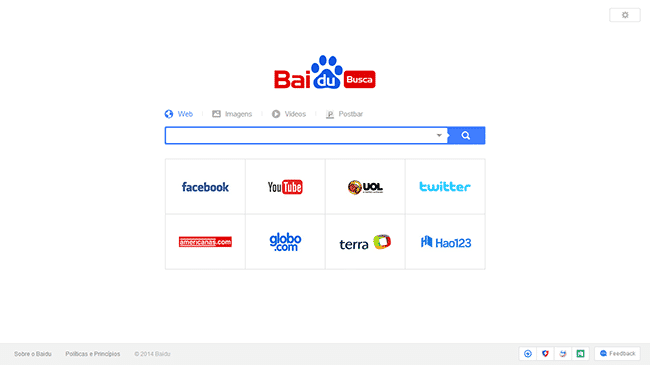Selection Of Marketing Tools Selection of Marketing Tools Tools That...

Chinese Search Engine
Promising Growth Opportunity
In March 2015, Baidu, the powerhouse Chinese search engine, ceased its search engine operations in Japan. As it turned out, they had not even made any updates to their index in more than 2 years, according to an interview they did with TechinAsia.
When Baidu first launched in Japan back in 2007, their goal was to become one of the two most commonly used search engines in the country. Their strategy was to be “very patient,” according to Baidu CEO Robin Li. Yet after eight years of trying to penetrate the Japanese market, little headway had been made. Thus, they eventually decided to cut their losses and move on.
Which countries are they targeting now? The company has been operating in Brazil since 2014, and they are conducting beta testing in Egypt and Thailand. The country where they are making their biggest push, however, is actually Indonesia, and for good reason: according to McKinsey, by 2030 the Indonesian economy will have risen to be the seventh largest in the world, beating Germany and the U.K. As the world’s fifth most populous country (with 250 million people), Indonesia is ripe for growth.
So despite the fact that Baidu does not even have a search engine running in the local language, the company is investing heavily in Indonesia as a major component of their business growth strategy
Baidu’s approach in Indonesia is a novel one; they actually chose to focus on mobile first and foremost. In addition, they have brought in apps like the Baidu Browser that were a huge hit in China and invented new local tools as well.
Within four months of opening their first Indonesian office in Jakarta in September 2013, Baidu’s PC Faster software, which provides both security and optimization, was being used by 3 million people. The DU Battery Saver, an Android app that helps users optimize their smartphones’ batteries, is their biggest success story so far – it has been downloaded by over 14 million users!
In the United States, of course, Google is known for being the dominant search engine in the market and for sponsoring all sorts of tech industry conferences and events. Yet in Indonesia, it is Baidu that has the stronger presence in this area. In fact, at the 2015 Echelon Indonesia conference, Baidu was the biggest sponsor, and Google was not there at all. Baidu took the opportunity to use the conference as a platform to publicize their Mobomarket appstore, which offers over 600,000 local apps for Android devices.
Do not be mistaken, though – Baidu is not yet taking on Google head-on as they do not operate a local search engine in Indonesia at this time. By emphasizing mobile most heavily, Baidu is positioning themselves to be the largest player in that space, which will be the primary or even only means of Internet access that many Indonesians will ever own. To this end, Baidu is focusing their development initiatives on projects that will have the greatest impact for the local user base, and this localization will be a key factor in their long-term success. As a part of this focus, the company is establishing a reputation for conducting research on mobile device use in Indonesia, attending startup events where they can push their local apps, and creating partnerships with local universities.
1. Right now only 24% of Indonesians have ever accessed the Internet, but that statistic is rapidly changing, and Baidu is prepared to take the throne as the most widely used search engine in the country.
2. The fact that Baidu has chosen to operate only in the mobile sector demonstrates the critical importance of mobile.
3. Although iPhones are an aspirational product in Indonesia, one that demonstrates one’s wealth and success, Baidu is only focusing on Android. Other companies seeking to enter the Indonesian market would be well-advised to do the same.
The bottom line: Baidu seems to be on the path to dominance in the growing Indonesian market. Taking a leaf out or two of our their book will likely benefit other companies looking to expand into the country.
Selection Of Marketing Tools Selection of Marketing Tools Tools That...
Why Consider Bing for SEO Strategy? Search Engine On The...
Importance of High Quality Images on the Web An Important...
What Are The Best Free WordPress Plugins? Content Management System...
What Are Some Good Google Remarketing Practices? Google Remarketing Practices...
A Guide to the F Pattern Layout for Text-Heavy Websites...
What Trends In Web Design Are We Seeing In 2015?...
Hottest Trends In Ecommerce Web Development Ecommerce Web Development Current...
A Guide To YouTube Search Engine Optimization Techniques YouTube Search...
Effective Types of Personalized Product Recommendations An E-commerce Store Effectively...
5 E-commerce Stores With Impressive Shopping Experience E-commerce Websites Following...
Benefits Of Using Web Design Templates Types of Templates You...
The Best SEO Company Does Not Offer Ranking Guarantees Ranking...
Top SEO Trends That Dominated 2017 Constantly Evolving Search Engine...
Ecommerce Conversion & Optimization Landing Page Optimization Attaining Higher Sales...
Should You Focus On Page Rank Or Domain Authority? Page...
Choose Us For Website Design Nova Solutions You’ve already made...
What Internet Marketing Services Do I Need for My Company?...
A Guide to Boosting Your Website Speed Responsive Web Design...
The Art of Republishing Old Content It is not possible...
Changes In The Web That Are Important To Note Changes...
Effective Marketing Strategies Don’t Only Focus On SEO Effective Marketing...
Adwords Management: The Effectiveness Of Call Extensions Adwords Management Call...
Flat and Minimal Website Design Tips 3-D Websites How to...
Important Questions To Ask Any Potential Web Design & Development...
Google’s Local 3-Pack Google Local Pack Maintaininh Their Competitive Edge...
How Do I Increase Clicks With Online Banner Advertising? Online...
Creating An Effective SEO Strategy Growing Online Presence Time And...
Want to Create an Ideal Ecommerce Site? Here is What...
What Is Google PageRank Does Google PageRank Really Matter? Search...
Ways To Make Your Online Shopping Website Design Unique Online...
What Are The Elements Of Good Interaction Design? Good SEO...
Effectively Find Customers For Your Toronto Business With Local SEO...
Automotive Dealership SEO Campaign SEO Tactics Optimizing your Web Pages...
Working With An SEO Company In Toronto For Google News...
Blog Search Engine Marketing Benefits & Ideas For Local SEO...
The Benefits Of Bing Advertising Bing Advertising Pay-Per-Click Market Online...
How SEO Marketing Compares To The Entertainment Industry? SEO Marketing...
Why Does Landing Page Design Matter? We are often asked...
How To Improve Your Local Online Marketing Local Online Presence...
What Are Some Unique Tactics Offered by SEO Companies? Unique...
Automotive Dealership SEO Campaign Remarketing Services for Online Business Advertising...
Nova Solutions Headquarters
700 University Ave, Toronto, ON M5G 1X6
Tel: +1 800-790-3082
Office Hours: M-F 9am – 9pm
Copyright © 2021 Nova Solutions Corporation | All Rights Reserved.
Working with Third-Parties








A good website starts with stunning design. As the Lead Designer at Nova,
Andrew uses his vast experience with web development, graphic design &
brand building to create the majority of our web portfolio. He has worked
with many CMS & commerce products and has built innumerable websites.
Andrew excels at creating stunning (UXD) User Experience Design and
endeavors to put a little bit of soul in every web design project so that it may
have a life of its own.






Kevin is a strategic thinker that can quickly evaluate and find creative
solutions to challenging digital problems. Since 2001, he has been
developing solutions that not only maximize digital presences
but that also have the most impact on markets.
Kevin is a Senior Consultant at Nova Solutions who is passionate about SEO,
user experience and conversion optimization.
